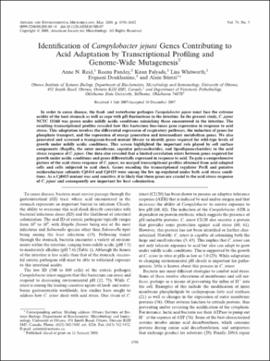| dc.contributor.author | Reid, Anne N. | |
| dc.contributor.author | Pandey, Reenu | |
| dc.contributor.author | Palyada, Kiran | |
| dc.contributor.author | Whitworth, Lisa | |
| dc.contributor.author | Doukhanine, Evgueni | |
| dc.contributor.author | Stintzi, Alain | |
| dc.date.accessioned | 2018-08-29T14:24:27Z | |
| dc.date.available | 2018-08-29T14:24:27Z | |
| dc.date.issued | 2008-03 | |
| dc.identifier | oksd_reid_identificationo_2008 | |
| dc.identifier.citation | Reid, A. N., Pandey, R., Palyada, K., Whitworth, L., Doukhanine, E., & Stintzi, A. (2008). Identification of Campylobacter jejuni genes contributing to acid adaptation by transcriptional profiling and genome-wide mutagenesis. Applied and Environmental Microbiology, 74(5), 1598-1612. https://doi.org/10.1128/AEM.01508-07 | |
| dc.identifier.uri | https://hdl.handle.net/11244/301596 | |
| dc.description.abstract | In order to cause disease, the food- and waterborne pathogen Campylobacter jejuni must face the extreme acidity of the host stomach as well as cope with pH fluctuations in the intestine. In the present study, C. jejuni NCTC 11168 was grown under mildly acidic conditions mimicking those encountered in the intestine. The resulting transcriptional profiles revealed how this bacterium fine-tunes gene expression in response to acid stress. This adaptation involves the differential expression of respiratory pathways, the induction of genes for phosphate transport, and the repression of energy generation and intermediary metabolism genes. We also generated and screened a transposon-based mutant library to identify genes required for wild-type levels of growth under mildly acidic conditions. This screen highlighted the important role played by cell surface components (flagella, the outer membrane, capsular polysaccharides, and lipooligosaccharides) in the acid stress response of C. jejuni. Our data also revealed that a limited correlation exists between genes required for growth under acidic conditions and genes differentially expressed in response to acid. To gain a comprehensive picture of the acid stress response of C. jejuni, we merged transcriptional profiles obtained from acid-adapted cells and cells subjected to acid shock. Genes encoding the transcriptional regulator PerR and putative oxidoreductase subunits Cj0414 and Cj0415 were among the few up-regulated under both acid stress conditions. As a Cj0415 mutant was acid sensitive, it is likely that these genes are crucial to the acid stress response of C. jejuni and consequently are important for host colonization. | |
| dc.format | application/pdf | |
| dc.language | en_US | |
| dc.publisher | American Society for Microbiology | |
| dc.rights | This material has been previously published. In the Oklahoma State University Library's institutional repository this version is made available through the open access principles and the terms of agreement/consent between the author(s) and the publisher. The permission policy on the use, reproduction or distribution of the material falls under fair use for educational, scholarship, and research purposes. Contact Digital Resources and Discovery Services at lib-dls@okstate.edu or 405-744-9161 for further information. | |
| dc.title | Identification of Campylobacter jejuni genes contributing to acid adaptation by transcriptional profiling and genome-wide mutagenesis | |
| osu.filename | oksd_reid_identificationo_2008.pdf | |
| dc.description.peerreview | Peer reviewed | |
| dc.identifier.doi | 10.1128/AEM.01508-07 | |
| dc.description.department | Veterinary Pathobiology | |
| dc.type.genre | Article | |
| dc.type.material | Text | |
| dc.subject.keywords | alkanesulfonates | |
| dc.subject.keywords | bacterial proteins | |
| dc.subject.keywords | dna primers | |
| dc.subject.keywords | gene expression profiling | |
| dc.subject.keywords | gene library | |
| dc.subject.keywords | hydrogen-ion concentration | |
| dc.subject.keywords | microarray analysis | |
| dc.subject.keywords | mutagenesis | |
| dc.subject.keywords | transcription factors | |
